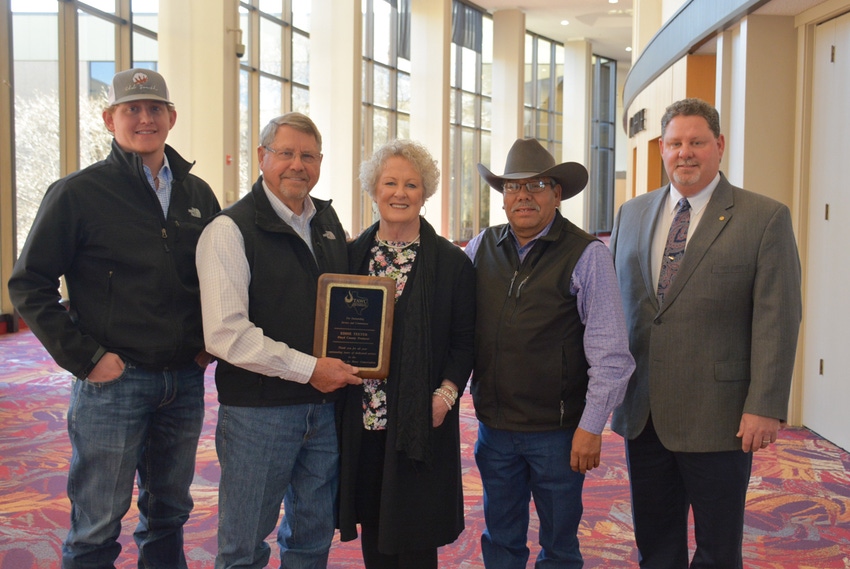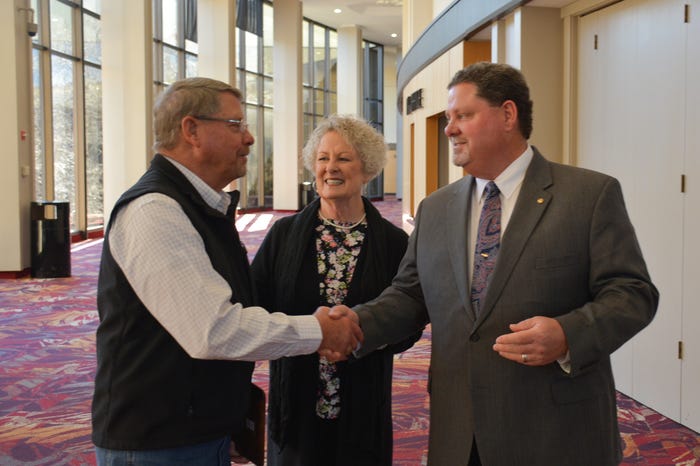
When Eddie Teeter looks in the rearview mirror of his 53-year farming career, he remembers a time when soil moisture depth was determined with a shovel, crops were row-watered, and winters were a time for making several trips across a field.
“We used to moldboard to turn the land over, then we would float, and then list — we had to list to pre-water. Then we would run a rolling cultivator to build up the beds, and then run one to flatten them out so we could plant. We spent all winter doing that. Now, we make one or two trips across the field and we’re ready to plant.”
See, Variable rate irrigation used to increase efficiency
Where Teeter once had enough water to pump 800 gallons to 900 gallons per minute on his farms south of Lockney, Texas, he now only has 250 gallons to 300 gallons per minute — motive to convert his row water to center pivots and drip irrigation, but also to serve on the producer’s board for the Texas Alliance for Water Conservation (TAWC) project.
The project is a partnership of area producers, data collection technologies, and collaborating partners that include industries, universities, and government agencies. Production-related decisions for the project are made by the producers involved in the project and spearheaded by a producer board.
Teeter, TAWC’s first producer board president in 2005 and its current secretary, was recently honored for his outstanding service and commitment to TAWC at the alliance’s annual Water College at Lubbock, Texas.
SUPPORTER, LEADER, ADVOCATE
“Eddie has been an avid supporter, leader, and advocate for TAWC and for its efforts toward outreach, management, and the conservation of all of our precious resources,” said TAWC Moderator and Outreach Coordinator Dr. Rudy Ritz. “We thank Eddie for his many years of dedicated service.”
Joining Eddie to receive his award was his wife of 53 years, Cheryl; their son, Monty Teeter; farm employee of 25 years, Rudy Fernandez; and the next generation of Teeter farming, grandson Riley Teeter.
"Producers like Eddie Teeter are the innovators and pioneers in coping with the day to day challenges faced every day by agriculture and its efforts to supply food and fiber to the world," said TAWC Project Director Rick Kellison.
Eddie retired a year ago, and Riley, who graduated from West Texas A&M with an agriculture business degree, will be taking over the family farm. When asked about his concerns about the future of water in his area, Riley says, “I’m scared of running out of water. It may not happen in my granddad’s lifetime, but I’m scared of it happening in mine. Farming has changed so much. You have to stay up with the technology the best you can.”

Son to the Father
One of the resources Eddie has utilized and is available to Riley or any grower is the information provided on the TAWC website. “When we know how much water we’ve got, we can go to the TAWC website to access the Resource Allocation Analyzer,” Eddie explains.
MOST EFFICIENT CROP
“It will show us the most efficient crop to plant on a particular farm, based on the amount of water available. We can also use the website to plan our irrigation schedule. It keeps track of heat units, the growth of the plant, what stage it’s in, and when it’s going to need the water. There’s so much more now than taking a shovel out there and digging down to see what the moisture is like.”
See, Texas growers convert pivot acres to drip
Other tools Eddie has used to increase his irrigation efficiency are soil moisture probes, FieldNET, and LEPA irrigation.
Though Eddie has retired from farming, he says he’s not retired from advocating for and supporting the mission of the organization. “TAWC is very important to our area because of water conservation. Anything I can do to help keep that going, I’m going to do it.”
See, Photo Gallery, TAWC hosts 5th annual Water College
About the Author(s)
You May Also Like






